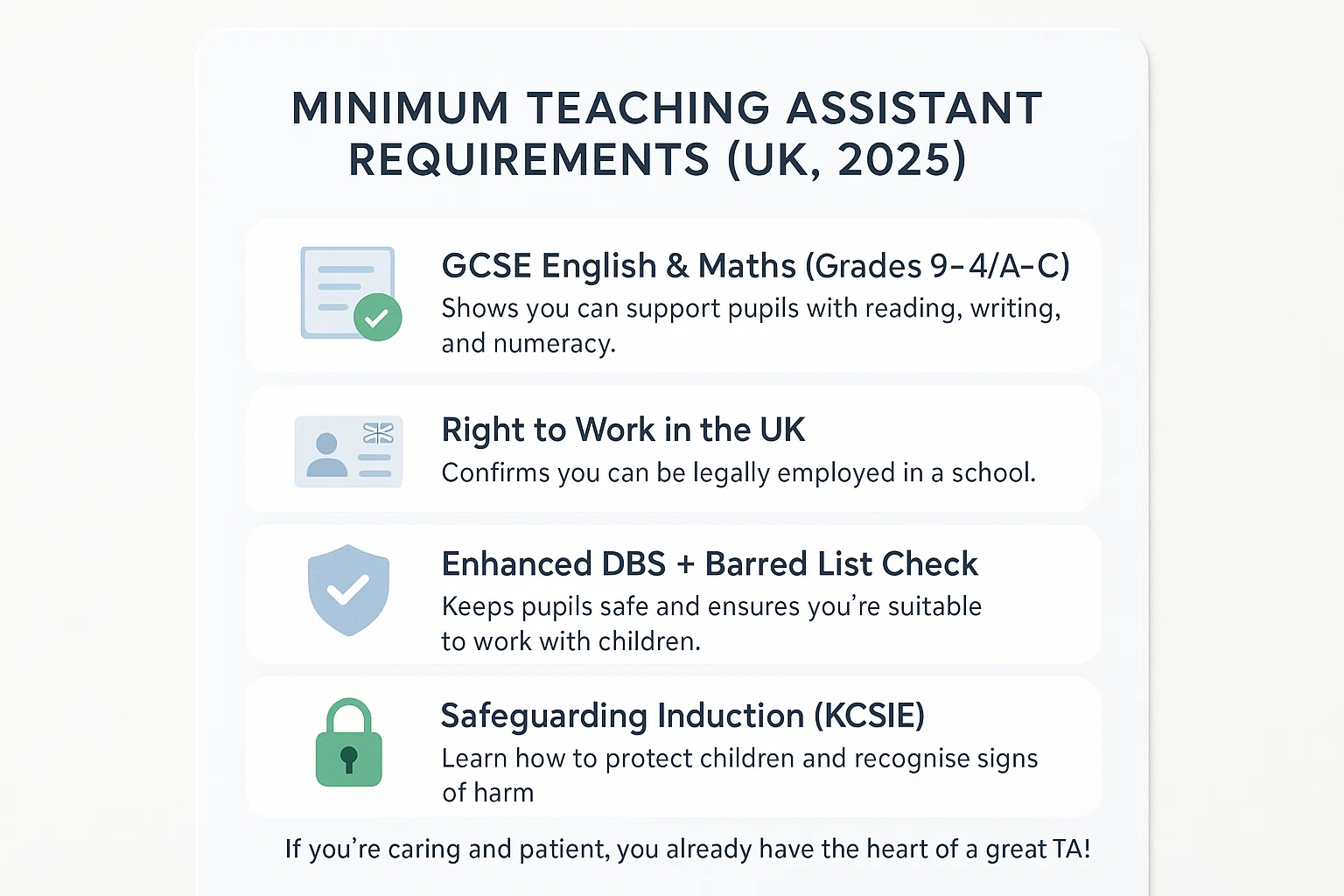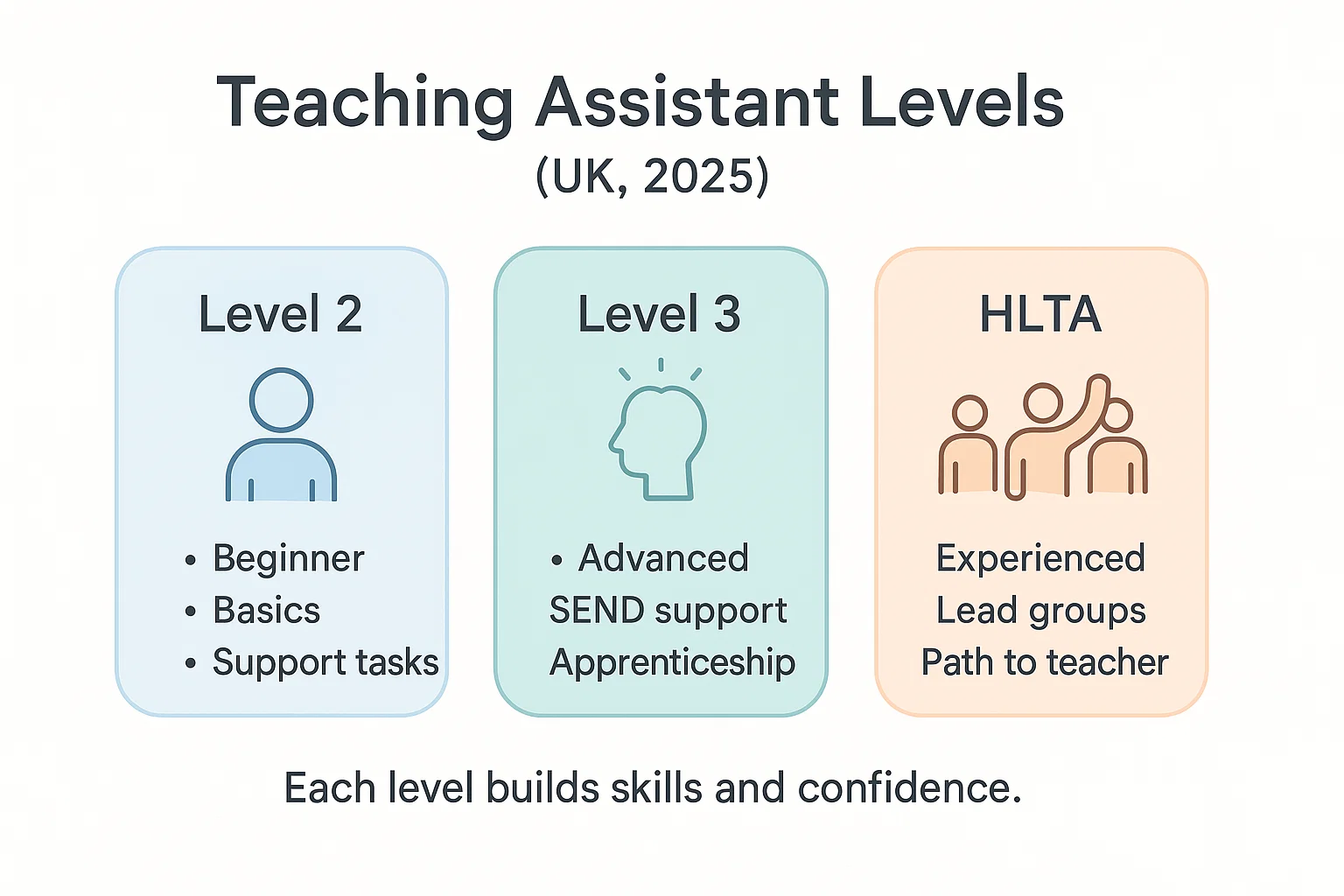No products in the cart.
Are you wondering what the teaching assistant requirements are in the UK for 2026? Let’s make it simple. Each school sets its own rules, but most ask for GCSE English and maths at grades 9–4 (A–C). You’ll also need good references and a kind, caring nature that shows you’re great with children. Because you’ll work closely with young people, an enhanced DBS check is a must. This includes the children’s barred list, which keeps schools safe and secure.
In this article, we explore teaching assistant requirements in the UK for 2026. You’ll learn what qualifications schools usually ask for, what skills help you stand out, and why background checks are so important. We’ll also look at how requirements may vary between schools and how you can prepare for your application. By the end, you’ll clearly understand what you need to become a teaching assistant and how to start your journey with confidence.
What Are the Minimum Teaching Assistant Requirements?

Here’s a quick look at the minimum requirements teaching assistant roles usually ask for in the UK
- GCSE English and maths (grades 9–4/A–C) or an equivalent qualification.
These show you can support pupils with reading, writing, and numeracy. - Right to work in the UK.
This confirms you can be legally employed in a school. - Enhanced DBS check with the children’s barred list.
This keeps pupils safe and ensures you’re suitable to work with children. - Safeguarding induction training (KCSIE).
You’ll learn how to protect children and recognise signs of harm.
If you’re caring, patient, and love helping young minds grow, you already have the heart of a great TA — the rest is just ticking off the what do you need to be a teaching assistant checklist!
Do You Need Qualifications to Apply for a TA Job?
The answer is — not always! There’s no single national rule or mandatory TA certificate in the UK.
Most schools are happy if you have GCSEs in English and maths and some experience working with children. This could come from volunteering at a school, helping with after-school clubs, or even supporting your own kids with learning at home.
However, having a qualification can really boost your chances. Many people choose one of these popular options:
- Level 2 or Level 3 Certificate in Supporting Teaching and Learning
- Level 3 Teaching Assistant Apprenticeship
These courses help you gain classroom skills, understand child development, and build confidence in supporting teachers.
So, if you’re still asking, what qualifications do I need to be a teaching assistant? Remember — it’s about showing your passion for helping children learn. The right mix of experience, care, and learning will take you far!
What GCSEs or Skills Do Schools Ask for in a Teaching Assistant?
Let’s look at the GCSE requirements teaching assistant jobs usually ask for. Most schools want you to have GCSE English and maths at grades 9–4 (A–C) or an equivalent qualification. These show that you can help pupils with reading, writing, and basic maths.
But it’s not just about exams — your teaching assistant skills matter just as much. Schools love people who can connect with children and make learning fun.
Here’s what schools usually look for:
- GCSE English and maths (grades 9–4/A–C) or equivalent
- Basic literacy and numeracy skills
- Good communication – to explain clearly and listen with care
- Teamwork – to support teachers and work well with others
- Patience – because every child learns differently
- Positivity and empathy – to create a happy, safe classroom environment
So, while GCSEs give you a strong start, your attitude and soft skills truly make you shine as a teaching assistant.
Do You Need Experience to Work as a Teaching Assistant?

You might be wondering if you can get a TA job with no experience. The truth is, it’s possible — but having some experience really helps. Schools love applicants who already know how to work with children. It shows that you understand their needs and can create a calm, caring learning space. Even for entry-level roles, many job adverts mention that experience is preferred.
Here are some great ways to gain experience:
- Volunteering at a local school or nursery
- Helping in youth groups or after-school clubs
- Working in childcare or babysitting
- Supporting reading or homework sessions
- Assisting with holiday or community programmes
All these experiences show that you’re patient, reliable, and ready to help children learn. So, while it’s possible to start with no experience, a little hands-on practice will make your experience for teaching assistant applications shine!
What Checks and Paperwork Are Needed for TA Roles (DBS, ID, References)?
Before starting your new job, schools will ask for a few important checks and documents. These help make sure every classroom stays safe and professional.
First, you’ll need an enhanced DBS check, which includes the children’s barred list. This is a legal requirement for anyone doing regulated work with children. It confirms that you’re safe to work in a school.
You’ll also need to show proof of identity and right to work in the UK — things like your passport or birth certificate. Most schools also ask for professional references from people who can vouch for your character and work with children. Finally, some schools may request a simple medical or fitness check to ensure you’re ready for the role.
Here’s a quick list of what you’ll usually need:
- Enhanced DBS check with children’s barred list included (DBS teaching assistant requirement)
- Proof of identity and right to work in the UK
- Professional references – usually two, from employers or supervisors (teaching assistant references)
- Medical or fitness declaration, if the school asks for it
These steps might sound formal, but they’re there to protect both you and the children you’ll support. Once you have them sorted, you’re all set to start your rewarding TA journey!
Teaching Assistant Salary (UK) in 2026
Most school TAs in England are paid on the NJC local government pay scale, not the teachers’ one. From 1 April 2025, pay rose by 3.2%, making the common full-time starting rate £24,413 a year (SCP2).
Many TA jobs are term-time only, so pay is pro-rated — for example, 38–40 working weeks paid across 12 months. On a 37-hour week, that’s about £12.65 an hour. Higher grades or HLTA roles earn more. Always check your local council’s NJC pay table for exact rates and local weightings.
If you’d like to know more about what you could earn after training, check out our latest guide — How Much a Teaching Assistant Earns in the UK (2025). It’s a quick, helpful read that shows what to expect once you step into this rewarding role.
What Training or Courses Help You Become a Teaching Assistant?
If you’re ready to start your journey, some great teaching assistant courses can help you build skills and confidence.
Most people begin with one of these recognised options:
- Level 2 Award in Support Work in Schools and Colleges – It’s a perfect starting point if you want to become a Teaching Assistant. It teaches you how schools work, how to support teachers, and how to help pupils learn.
- Teaching Assistant course – they help you to learn classroom skills, child support techniques, and gain the qualifications schools look for.
These courses teach you how to support pupils, understand lesson planning, and work safely in schools. You’ll also gain real classroom experience, which makes finding a job much easier.
Do You Need Safeguarding or First Aid Certificates as a TA?

When you start as a TA, safeguarding for teaching assistants is a must. Every school gives this training during your induction, following the Keeping Children Safe in Education (KCSIE) guidelines (GOV.UK). It helps you spot risks, protect pupils, and know what to do if a child needs support.
First aid training isn’t required everywhere, but it’s a big plus. In Early Years Foundation Stage (EYFS) settings, at least one staff member must have Paediatric First Aid (PFA) certification. Many primary schools also prefer paediatric first aid teaching assistants, as it keeps children safer during school hours. So, while safeguarding is essential for every TA, adding first aid training shows extra care — and makes you even more valuable to any school team.
What Skills Do Schools Value Most in Teaching Assistants?
To succeed as a TA, you need more than just knowledge — you need the right mix of teaching assistant skills and attitude. Schools look for people who can support learning, stay calm under pressure, and bring warmth to the classroom.
Here are the top teaching assistant responsibilities and skills schools value most:
- Supporting learning – helping pupils understand lessons and build confidence
- SEND awareness – knowing how to support children with special educational needs or disabilities
- Behaviour support – keeping classrooms calm and positive
- Good communication – working well with teachers, pupils, and parents
- Teamwork – being reliable, flexible, and helpful
- Professional standards – showing respect, patience, and a caring attitude every day
When you combine these skills with genuine care for children, you become more than a helper — you become an essential part of the school community.
How Do Part-Time and Term-Time Contracts Affect TA Requirements?
You might be wondering — does being a part-time teaching assistant or term-time teaching assistant change what schools expect from you? The answer is simple: not really!
All TAs, no matter their hours, need the same essentials — a DBS check, safeguarding training, and the skills to support children in the classroom. Safety and care always come first.
The main difference is in how your work hours and pay are set. Part-time or term-time roles are pro-rated, which means you’re paid for the weeks you work (usually 38–40 a year), but your pay is spread evenly across the year. This setup is perfect if you want balance — maybe more time with family, a side project, or studies. You’ll still make a real difference in children’s lives without giving up your personal time.
In short: fewer hours, same heart. You’re still every bit the TA your pupils depend on.
What Are the Different Levels of Teaching Assistant Qualifications (L2, L3, HLTA)?

If you want to become a teaching assistant, there are three main levels you can explore. Each one helps you build new skills and take on more responsibility.
Here’s a quick breakdown:
Level 2 Teaching Assistant
- Great for beginners.
- Teaches classroom basics and child development.
- Helps you support teachers with everyday tasks.
Level 3 Teaching Assistant
- Builds on Level 2 skills.
- Lets you work more closely with pupils, including those with special needs.
- Can be taken as a qualification or a Level 3 Teaching Assistant Apprenticeship.
Higher Level Teaching Assistant (HLTA)
- For experienced TAs ready to take the next step.
- Allows you to lead small groups or cover full classes.
- Often, a pathway towards becoming a teacher.
Each level helps you grow, gain confidence, and make a real difference in children’s learning. So, choose your level — and start your journey today!
Can You Become a Teaching Assistant Without Previous School Experience?
Yes, you can! Many people become a teaching assistant with no experience — you just need passion, patience, and a love for helping children learn.
Here’s what can really help you get started:
- Volunteer at a local school – It’s a great way to gain hands-on classroom experience.
- Try childcare or youth work – Skills from babysitting or youth clubs count too!
- Get your GCSEs – Most schools ask for passes in English and Maths.
- Apply directly – Many schools and local authorities advertise entry-level teaching assistant jobs online.
Remember, everyone starts somewhere. With the right attitude and a bit of experience, you can build a rewarding career as a teaching assistant — even if you’re just starting out!
What Extra Requirements Apply for SEN Teaching Assistants?
Working as a SEN Teaching Assistant is one of the most rewarding roles in a school. You’ll help children with special educational needs (SEND) learn, grow, and feel confident every day. To do this job well, schools often look for:
- Experience with SEND pupils – even volunteering or supporting one-to-one makes a big difference.
- Extra SEN teaching assistant training – such as autism (ASD), ADHD, or communication support courses.
- Knowledge of tools like PECS or Makaton for non-verbal communication.
- Behaviour support skills – training like Team-Teach helps you handle challenging moments calmly.
So, if you’re caring, patient, and willing to learn, meeting these SEN teaching assistant requirements can open doors to a deeply fulfilling career.
Final Thoughts: How to Meet the Requirements and Get Hired as a TA
Meeting the teaching assistant requirements in the UK is all about being prepared. Schools look for the basics first — your GCSE English and maths, your DBS clearance, and your safeguarding knowledge. After that, what makes the difference is you. Extra training at Level 2 or 3 shows commitment, while any time spent working with children builds real confidence.
If you want to know how to become a teaching assistant UK, the steps are simple: gather your documents, get your checks done, and look for ways to gain experience before applying. Each action you take makes you more ready for the role. With the right mix of skills, care, and preparation, you will stand out — and schools will see you as a strong candidate.
If you’d like some extra support along the way, explore our Teaching Assistant course at Open Learning Academy. It’s designed to help you grow your skills, build confidence, and feel ready for the classroom.
FAQs About Teaching Assistant Requirements in the UK
- Can you be a TA with no experience?
Yes, you absolutely can! Many schools welcome new teaching assistants with no experience, especially if you show enthusiasm and a genuine love for helping children learn.
- Is being a TA a good job?
Yes — being a teaching assistant (TA) is a truly rewarding job, especially if you love helping children learn and grow.
- Is Becoming a Teaching Assistant Hard?
Not really — but it does take effort, patience, and a caring heart.
- Are Teaching Assistant Jobs at Risk?
Not really, though things can vary by school and funding.
- What Not to Do as a Teaching Assistant?
Avoid doing students’ work — it stops them from learning independently. Support and guide them instead, so they build skills and confidence.




